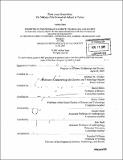Flesh yours, bones mine : the making of the biomedical subject in Turkey
Author(s)
Sanal, Aslihan
DownloadFull printable version (15.69Mb)
Alternative title
Making of the biomedical subject in Turkey
Other Contributors
Massachusetts Institute of Technology. Program in Science, Technology and Society.
Advisor
Michael M.J. Fischer.
Terms of use
Metadata
Show full item recordAbstract
With the emergence of biomedical technologies, human body parts from living or dead donors have become commodities in the international networks of trade. This dissertation tries to understand religious, political and ethical discourses on this emerging economy and how it creates its subjects in Turkey. By drawing analogies from the early days of anatomy and mental health practices and by using a three-fold-corpus (state, body and law) as a framework, it illustrates how the state, the religious law on the body, and social inequalities turn some subjects to objects of this biomedical practice while extending life for others. Life histories, oral histories, doctors' and patients' accounts, media reporting, urban legends, cinematography, theater, poetry and literature speak of this new biomedical life. The meaning of the cadaver, the brain-dead body, and the living donor are reevaluated. The personhood of suicides, the homeless, the poor, the mentally ill, the immigrant, and women are all questioned with the redefinition of boundaries of life and death. Biomedicine effects this kind of social change. (cont.) A cultural history of this production sheds a light onto how Turkey has become one of the centers of organ trafficking in the Middle East in the 1990s, how doctors generate biomedical politics inspired by their American or European counterparts, and how patients, who have acquired kidneys, rationalize and legitimize the world they live in while they seek for "a second life," "a humane treatment," and social equality. Simultaneously new definitions of the human, the person and the self emerge as a new body is reconstructed with parts originating from another human being. It is the history of the biomedicalization of the self.
Description
Thesis (Ph. D. in History, Anthropology, and Science, Technology and Society (HASTS))--Massachusetts Institute of Technology, Program in Science, Technology and Society, 2005. Includes bibliographical references (v. 2, leaves 252-257).
Date issued
2005Department
Massachusetts Institute of Technology. Program in Science, Technology and SocietyPublisher
Massachusetts Institute of Technology
Keywords
Program in Science, Technology and Society.